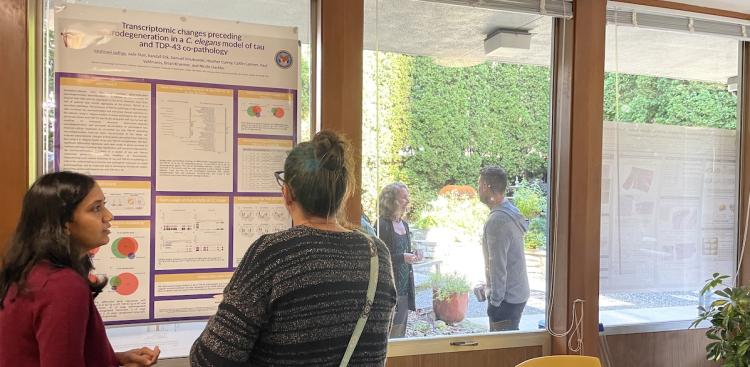On Friday, our researchers of all career stages gathered at the 2023 UW ADRC Research & Education REC Symposium for a day of learning and sharing their newest work in progress, with food and fun mixed in. And being in person together is what this annual event is all about.
"The REC Symposium is all about bringing everybody in the ADRC together and interacting in a genuine way," said Brian Kraemer, PhD, REC co-lead. "You can't get these connections, feedback, and career networking over Zoom. We will fly in (non-local) trainees to this symposium, instead of ever doing a hybrid event."
REC trainees and investigators shared new research on underlying mechanisms relevant to neurodegenerative disease - from insulin pathways, microglia cells, RNA trafficking to synapses, and perineuronal nets - to patterns of brain atrophy in the logopenic variant of PPA, how sleep apnea affects glymphatic clearance, the shared genetic etiologies in autosomal early-onset and sporadic Alzheimer's disease, and plasma Alzheimer's biomarkers, and this is just to name a few topics.
The REC program is providing something unique to researchers entering or seeking deeper involvement in the field of AD/ADRD. "I'm in the REC for the connections and to learn about other aspects of Alzheimer's research, such as imaging, that I wouldn't otherwise be exposed to," said REC Trainee Sam Smukowski, graduate student in the UW Valdmanis Lab.
"I appreciate being part of this welcoming and non-judgmental community where I can feel comfortable asking more basic questions about Alzheimer's disease I would feel uncomfortable asking elsewhere," said REC Trainee Makenzie Patarino, UW graduate student researcher, who got her first opportunities to present a poster and give a talk from her involvement in the REC.
REC Investigator Luciana Mascarenhas Fonseca, PhD, a neuropsychologist and associate in research in the WSU College of Medicine, feels that the REC amplifies her connections to Alzheimer's researchers and opportunities to share her work. "I feel very lucky to be part of the UW ADRC."
Thanks to Dr. Jeffrey Kaye for visiting to give the keynote on digital biomarkers, the UW DISC for the best raffle prize ever (a 3D printed brain opportunity), and the Frye Art Museum and the MBWC Memory Hub for the space for what simply couldn't unfold over Zoom.





